The Synology DS220j is an entry-level 2-bay NAS designed for those in need of a solution to back up their PCs and other devices they might have around the home or a very small office. In addition to the personal cloud, the DS220j is ideal for creating small media servers and easily sharing files.
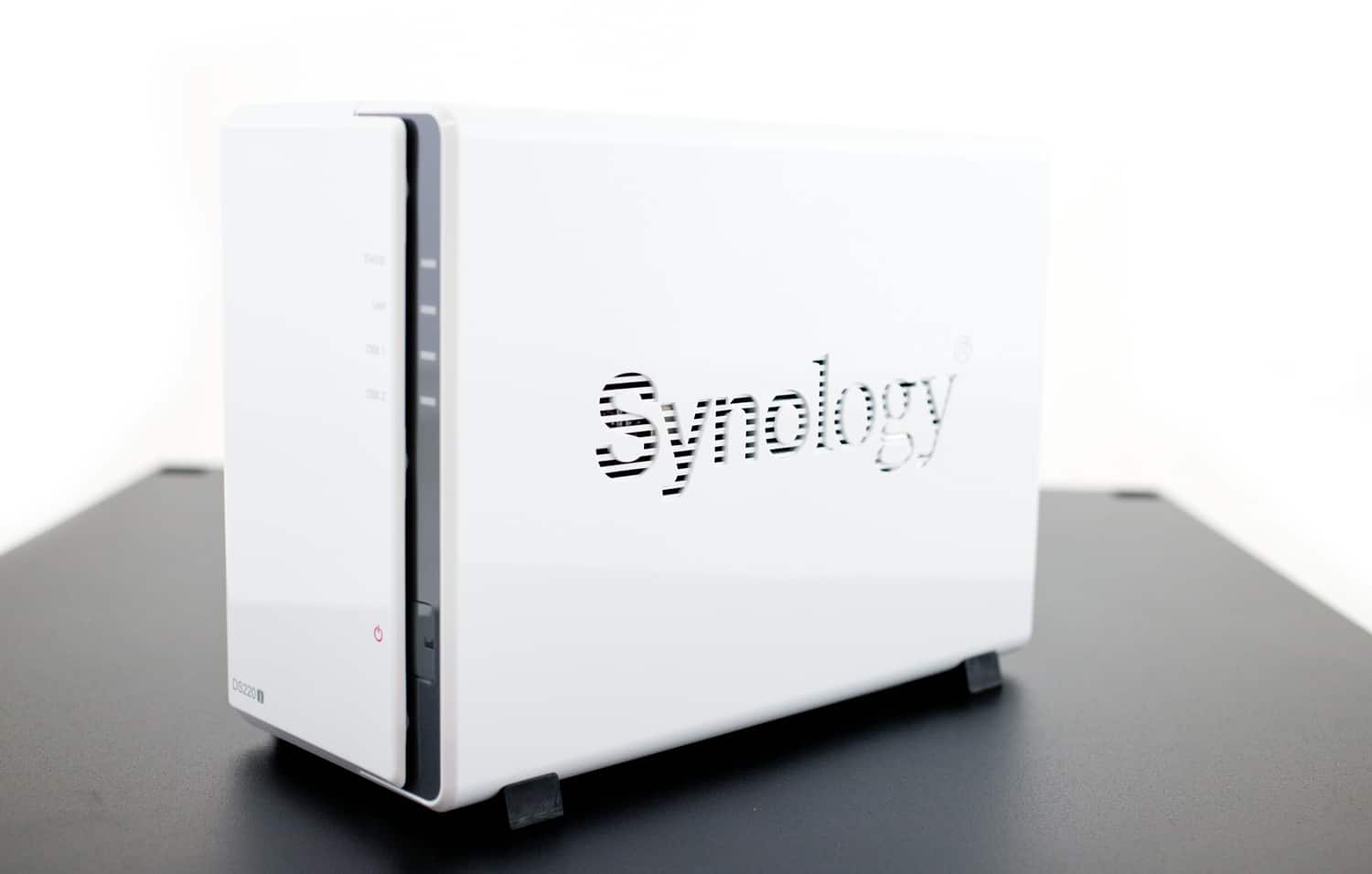
This line is not about big performance numbers (it quotes roughly 112MB/s in reads and writes), it’s about bringing all the power and features from Synology, as well as way to back up your data on a very reliable NAS device, at a very affordable price point. Capacity-wise, the DS220j supports up to 32TB via two 16TB drives, which is quite a bit for a 2-bay NAS.
What’s interesting about the DS220j line is that this is a series that Synology has been building on for quite a while now, as they release models about every two years with upgraded components. For example, the 218j model had a 2-core Marvell 1.3 GHz CPU inside coupled with DDR3 DIMM slots. The new DS220j is outfitted with a 4-core Realtek 1.6 GHz CPU with DDR4 DIMM inside (up to 512MB), so you’ll be getting a little more performance out of it.
Our video review is here:
Like all Synology NAS solutions, the DS220j runs the powerful and useful DiskStation Manager (DSM), which allows you to manage your device with ease. The DSM NAS operating system features a plethora of apps that focus on file server/management, multimedia, hyper backup, and security. Moreover, users can integrate their apps with smart devices via DS Audio, DS Photo, and DS Video, all of work seamlessly with Synology NAS solutions.
The new 2-bay Synology NAS was bundled with a pair of Seagate IronWolf 4TB drives, which we will be using for our performance tests.
Synology DS220j Specifications
| CPU | |
| CPU Model | Realtek RTD1296 |
| CPU Architecture | 64-bit |
| CPU Frequency | Quad Core 1.4 GHz |
| Hardware Encryption Engine | Yes |
| System Memory | 512 MB DDR4 |
| Storage | |
| Drive Bays | 2 |
| Compatible Drive Type | 3.5″ SATA HDD 2.5″ SATA HDD 2.5″ SATA SSD |
| Maximum Internal Raw Capacity | 32 TB (16 TB drive x 2) (Capacity may vary by RAID types) |
| Maximum Single Volume Size | 108 TB |
| Hot-Swappable Drive | Yes |
| External Ports | |
| RJ-45 1GbE LAN Port | 1 |
| USB 3.0 Port | 2 |
| File System | |
| Internal Drives | EXT4 |
| External Drives | EXT4 EXT3 FAT NTFS HFS+ exFAT |
| Physical | |
| Size (Height x Width x Depth) | 165 mm x 100 mm x 225.5 mm |
| Weight | 0.88 kg |
| System Fan | 92 mm x 92 mm x 1 pcs |
| Power | |
| Power Supply Unit / Adapter | 60W |
| AC Input Power Voltage | 100 V to 240 V AC |
| Power Frequency | 50/60 Hz, Single Phase |
| Power Consumption | 12.46 W (Access) 5.06 W (HDD Hibernation) |
| British Thermal Unit | 45.52 BTU/hr (Access) 17.27 BTU/hr (HDD Hibernation) |
| Temperature | |
| Operating Temperature | 0°C to 40°C (32°F to 104°F) |
| Storage Temperature | -20°C to 60°C (-5°F to 140°F) |
| Relative Humidity | 5% to 95% RH |
| Warranty | 2 Years |
Synology DS220j Design and build
Just like many other Synology NAS devices, the DS220j sports a bright white enclosure with the usual Synology logo on the side that doubles as ventilation. Overall, it looks great and feels solid when handled, which is par for the course when it comes to Synology devices.
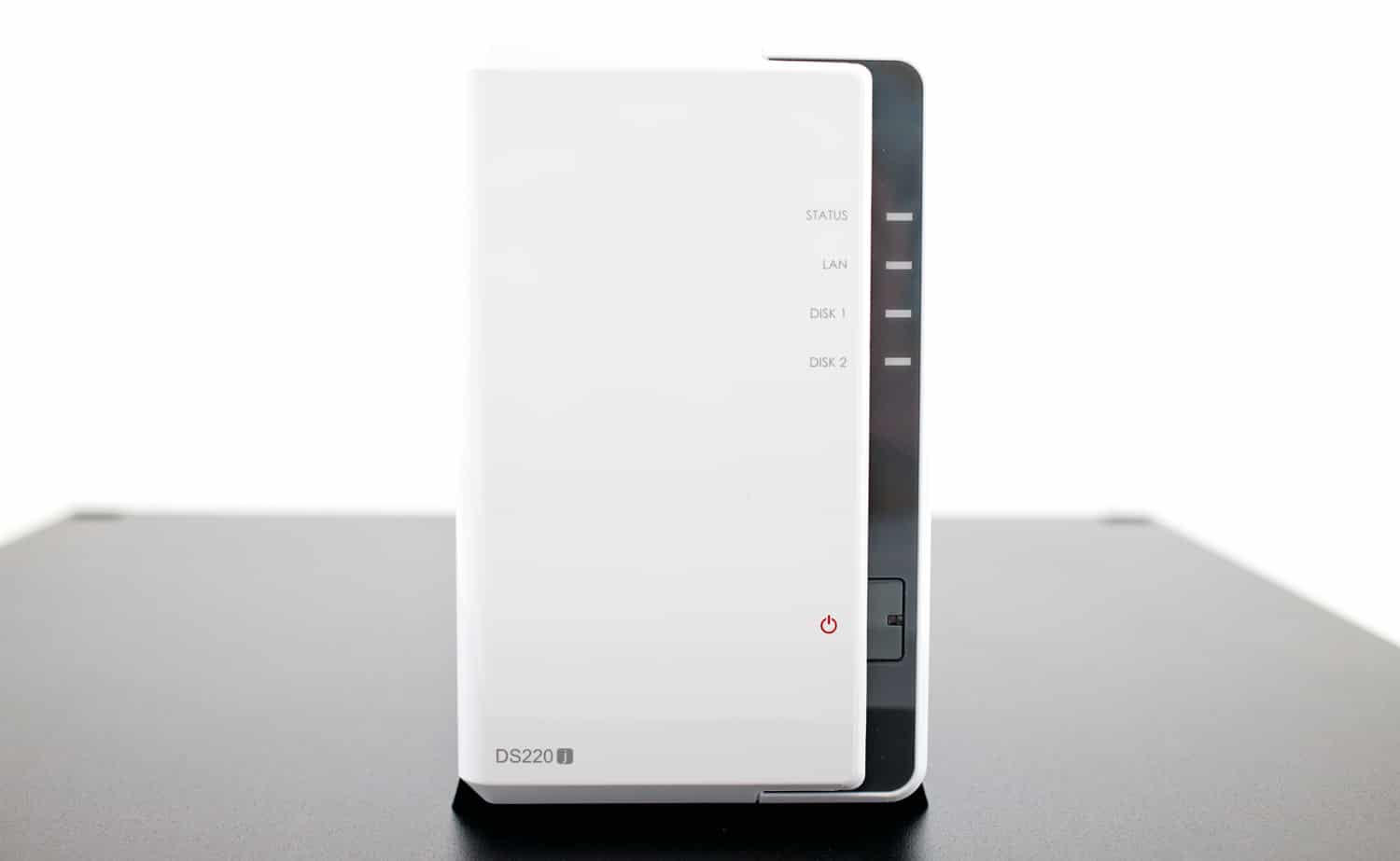
On the front panel, we have a standard power button and all the LED indicators: a LAN activity light, two disk activity lights, and a status light. Around the back, we have the fan, two USB 3.0 ports, onboard LAN port, a security slot, and the power connector.
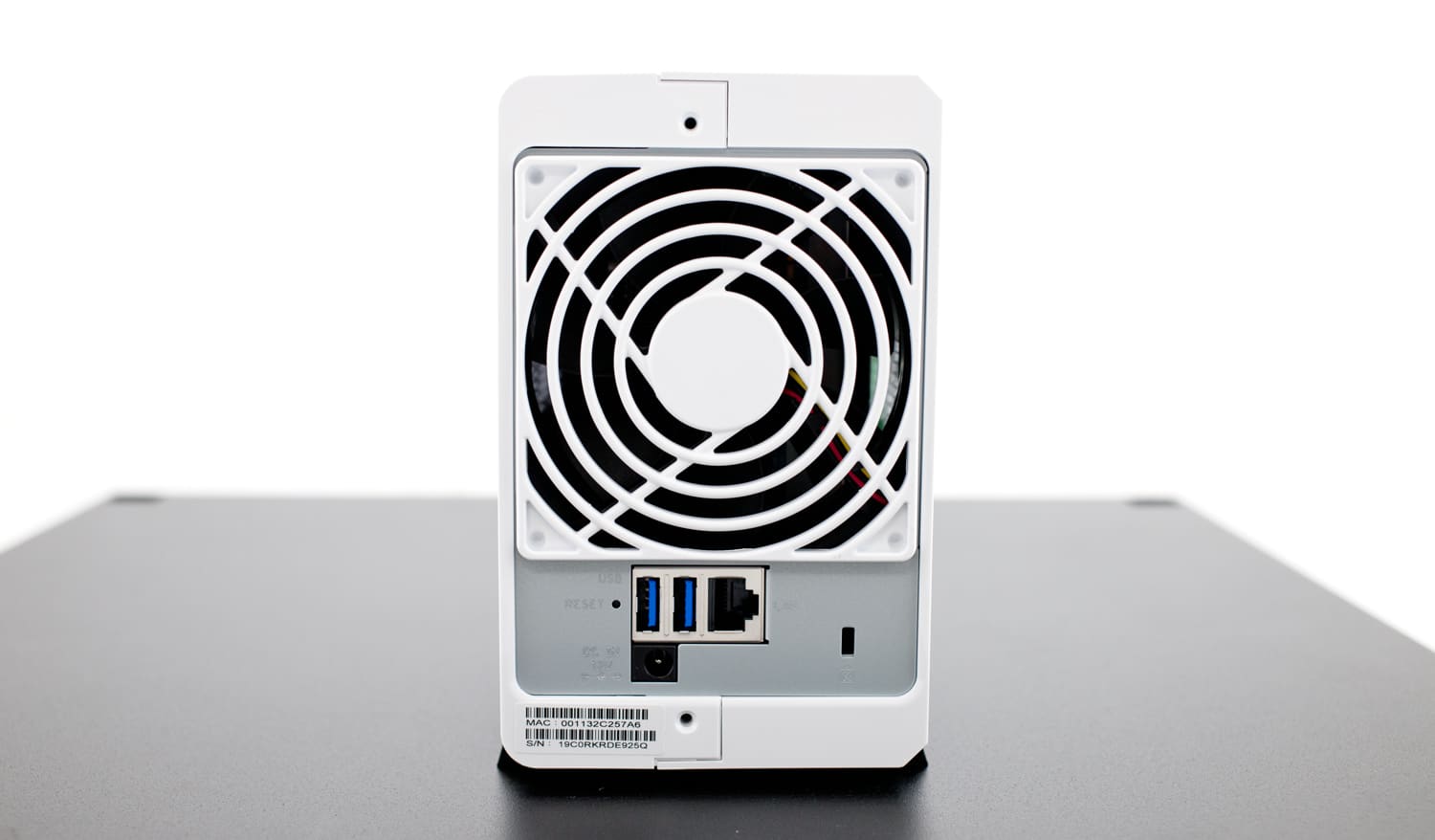
If the NAS is shipped bare (like ours), both screws have already been taken out on the back panel, which will save you some time when populating the DS220j with drives. As such, we were able to easily slide the front panel right off to the side. If you’re at all familiar with the inside of Synology device, you’ll notice right away it has the same layout as its other 2-bay DS solutions.
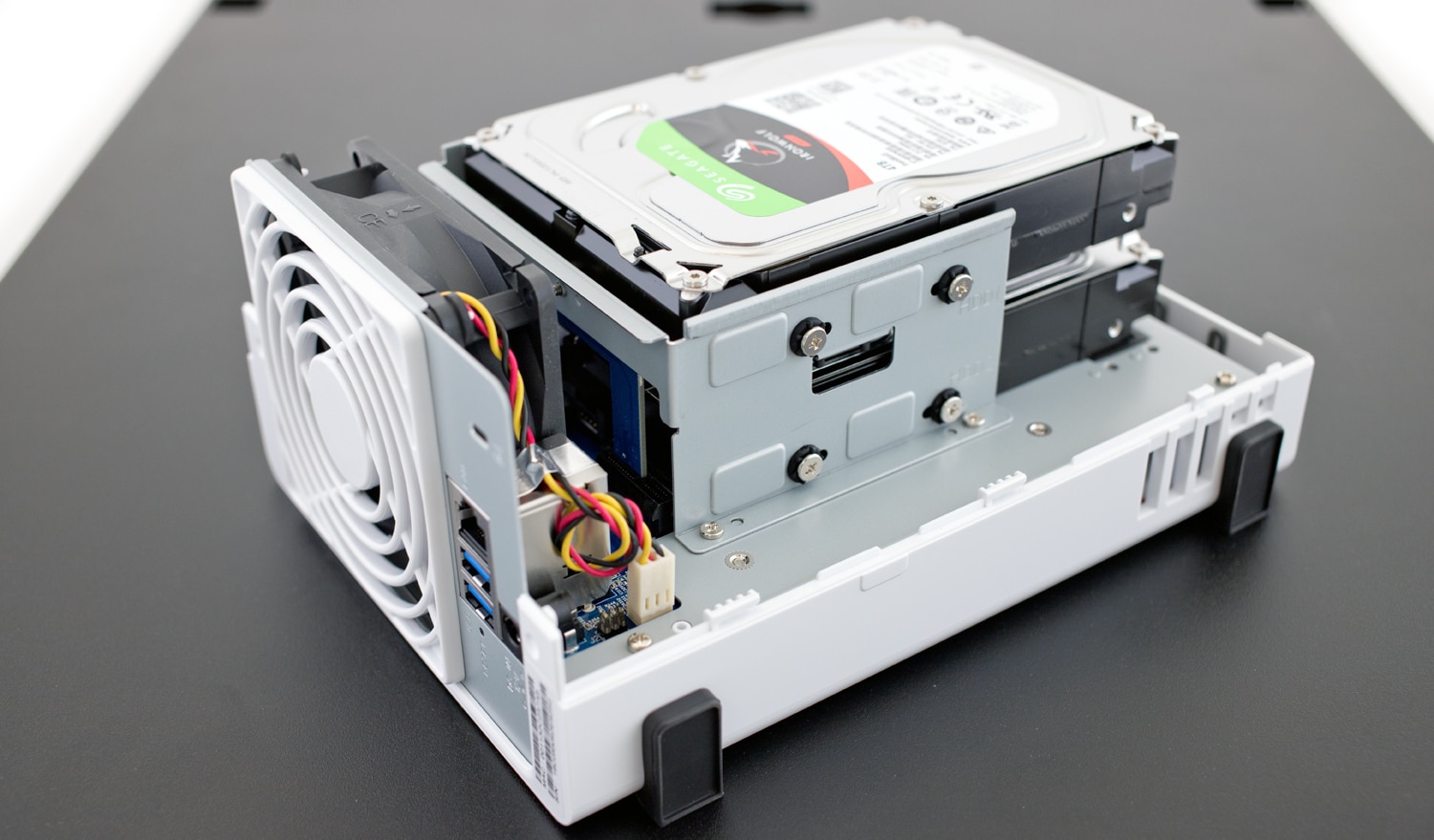
The DS220j is initially set up for 3.5-inch drives, though you can get a bracket adapter from Synology (or many other companies) if you want to secure your 2.5-inch drive with more than just one screw.
As a side note, the DS220j is shipped with a small metal piece with two circular holes, which can be mounted to the rectangular slot at the front of the interior. This gives an extra mounting option for 3.5-inch drives that don’t have the middle screw hole (for example, many of the helium drives).
Overall, the DS220j sports a very simple and easy to manage design.
Synology DiskStation DS220j Performance
Review Configuration
For our testing, we configured the Synology DiskStation DS220j in RAID1 using two 5900RPM 4TB Seagate IronWolf HDDs. Each disk configuration used EXT4 volumes and measured iSCSI and CIFS performance across one 1GbE LAN connection.
Enterprise Synthetic Workload Analysis
Our enterprise shared storage and hard drive benchmark process preconditions each drive into steady-state with the same workload the device will be tested with under a heavy load of 16 threads with an outstanding queue of 16 per thread, and then tested in set intervals in multiple thread/queue depth profiles to show performance under light and heavy usage. Since NAS solutions reach their rated performance level very quickly, we only graph out the main sections of each test.
Preconditioning and Primary Steady-State Tests:
- Throughput (Read+Write IOPS Aggregate)
- Average Latency (Read+Write Latency Averaged Together)
- Max Latency (Peak Read or Write Latency)
- Latency Standard Deviation (Read+Write Standard Deviation Averaged Together)
Our Enterprise Synthetic Workload Analysis includes four profiles based on real-world tasks. These profiles have been developed to make it easier to compare to our past benchmarks as well as widely-published values such as max 4k read and write speed and 8k 70/30, which is commonly used for enterprise drives.
- 4K
-
- 100% Read or 100% Write
- 100% 4K
- 8K 70/30
- 70% Read, 30% Write
- 100% 8K
- 8K (Sequential)
- 100% Read or 100% Write
- 100% 8K
- 128K (Sequential)
- 100% Read or 100% Write
- 100% 128K
In the first of our enterprise workloads, we measured a long sample of random 4K performance with 100% write and 100% read activity. With read IOPS, the Synology DiskStation DS220j showed 714 IOPS in iSCSI and 117 in CIFS. For write, it recorded 361 IOPS in iSCSI and 375 IOPS in CIFS.
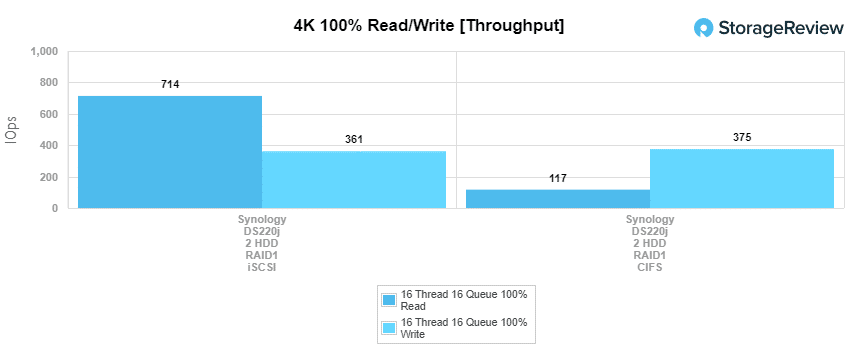
For 4K average latency, the DS220j had reads of 358.2ms iSCSI and 2,178.2ms CIFS, while write latency hit 707.8ms iSCSI and 680.7ms CIFS.
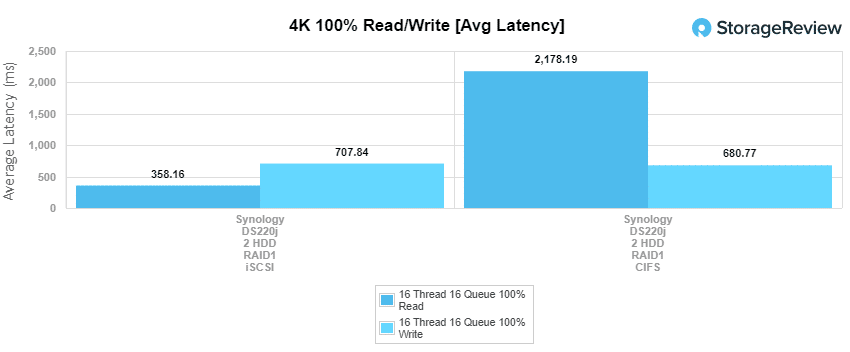
Moving on to 4K maximum latency, Synology NAS showed read scores of 1,709.5ms iSCSI and 4,083ms CIFS. Looking at write latency, we saw 5,971.7ms iSCSI and 3,837.6ms in CIFS.
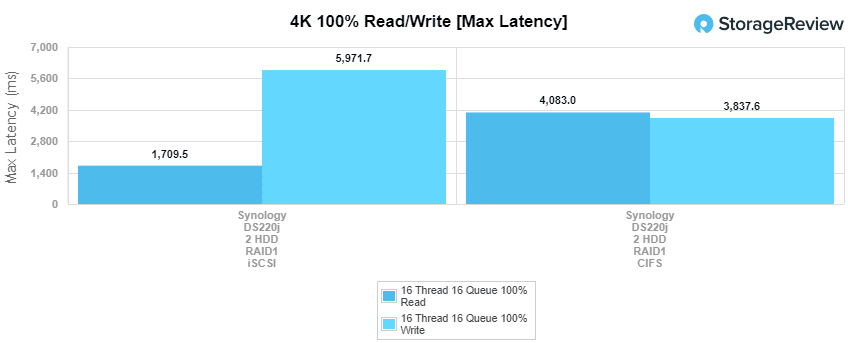
Our final 4K test is standard deviation where we saw read latency of 205.4ms in iSCSI and 123ms in CIFS. For write, we saw 739.5ms iSCSI and 245.1ms CIFS.
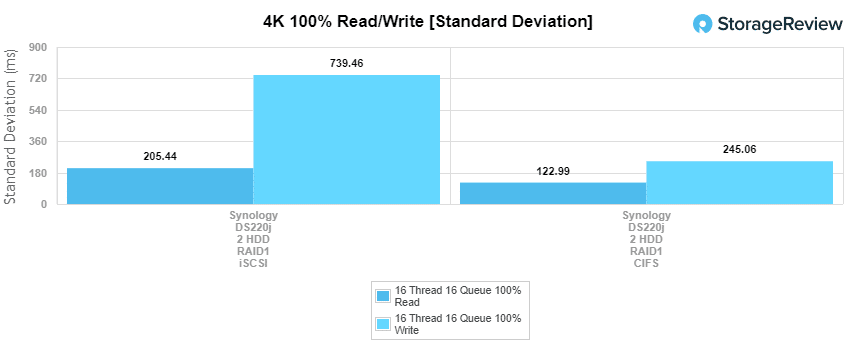
Our next benchmark measures 100% 8K sequential throughput with a 16T16Q load in 100% read and 100% write operations. Here, the Synology DiskStation DS220j posted a strong iSCSI scores of 14,274 IOPS read and 14,246 IOPS write. For CIFS, the DS220j showed 14,181 IOPS read and 10,988 IOPS write.
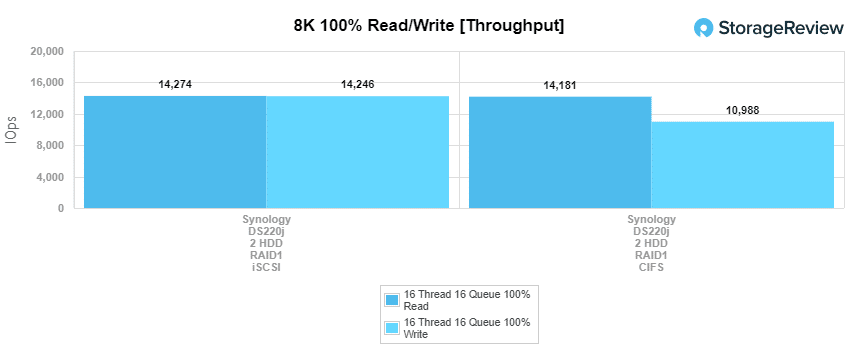
Compared to the fixed 16 thread, 16 queue max workload we performed in the 100% 4K write test, our mixed workload profiles scale the performance across a wide range of thread/queue combinations. In these tests, we span workload intensity from 2 threads and 2 queue up to 16 threads and 16 queue. Looking at throughput, the Synology DS220j showed highs of 455 IOPS iSCSI and 142 IOPS CIFS.
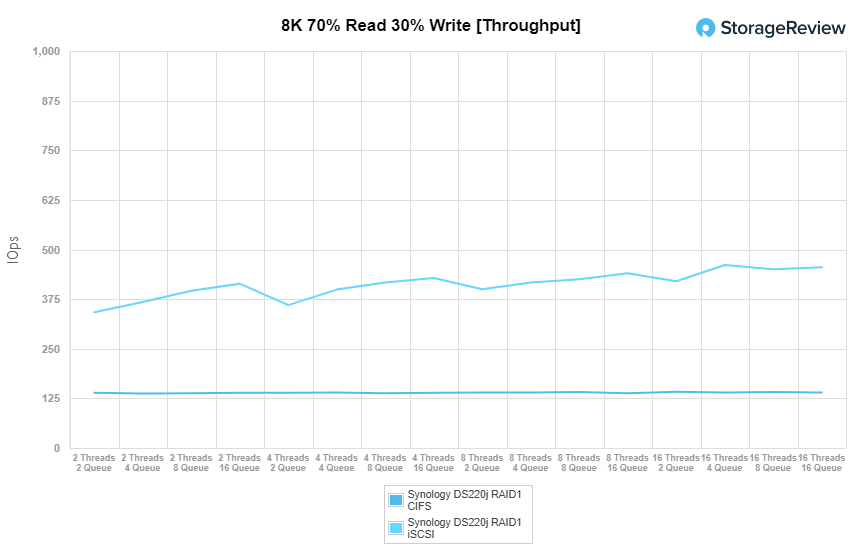
iSCSI showed significantly better results in our 8K 70/30 average latency results as well, with a finishing latency of 560.83ms compared to 1,815.5ms in CIFS.
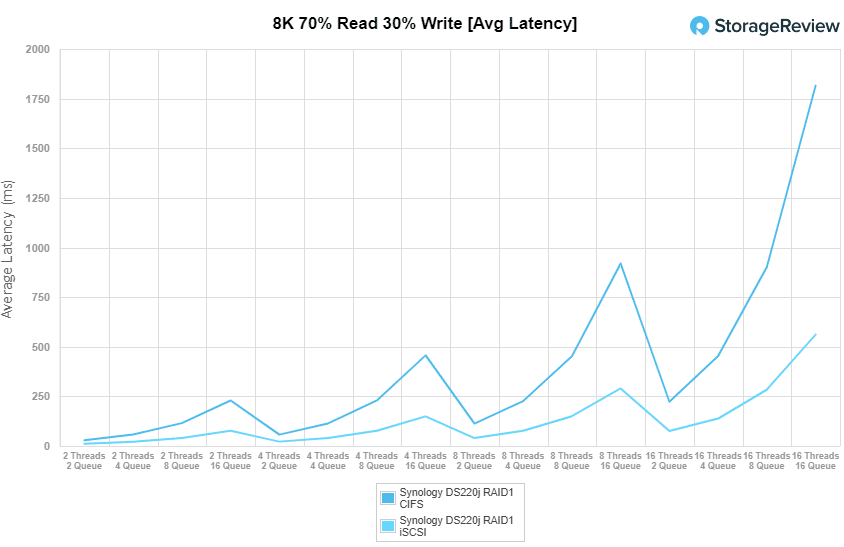
For 8K 70/30 max latency the CIFS configuration showed better initial results with 1,936.5ms (2 Threads 2 Queue) vs. iSCSI’s 2,515.4ms; however, by the end of the test, iSCSI showed much better latency with 3,743.2ms versus the CIFS’s 7,031.8ms.
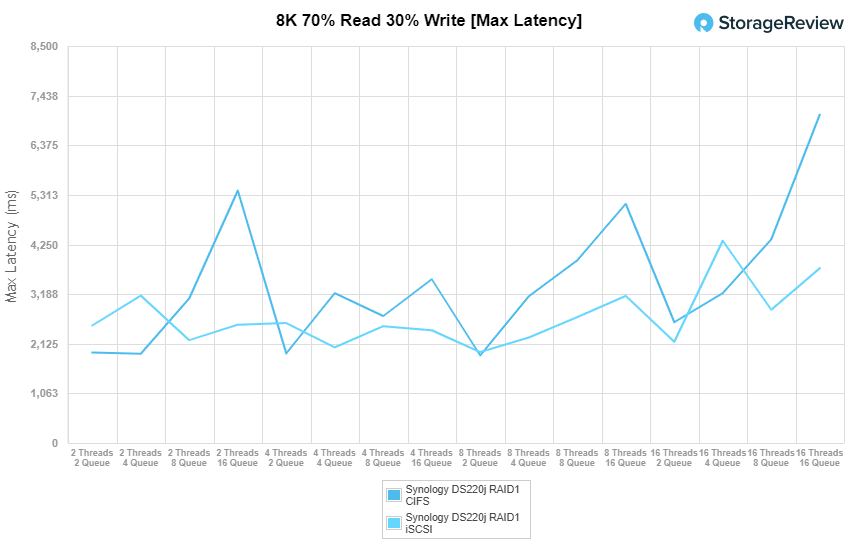
In 8K 70/30 standard deviation, iSCSI had slightly better results at the end with 651.4ms compared to 729.2ms in CIFS.
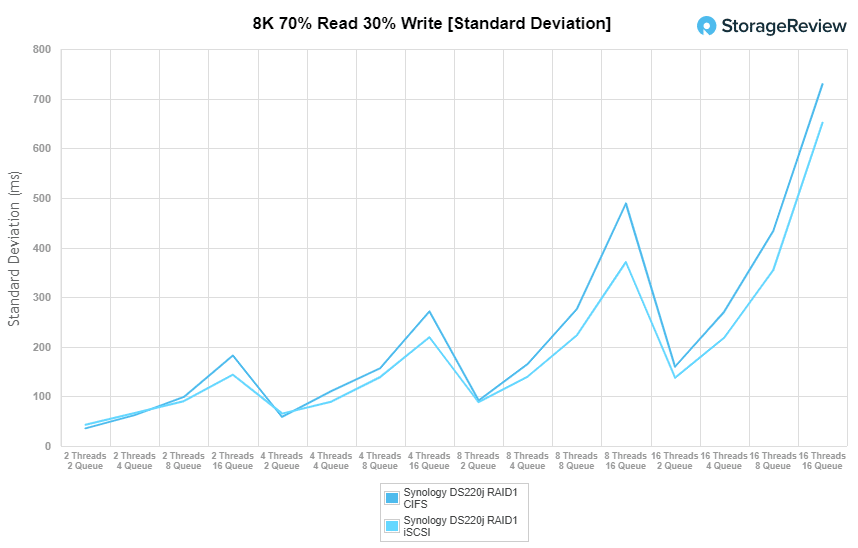
The last Enterprise Synthetic Workload benchmark is our 128K test, which is a large-block sequential test that shows the highest sequential transfer speed for a device. In this workload scenario, the iSCSI configuration saw 115.6MB/s read and 115.5MB/s write while CIFS had 115.7MB/s read and 114.9MB/s write.
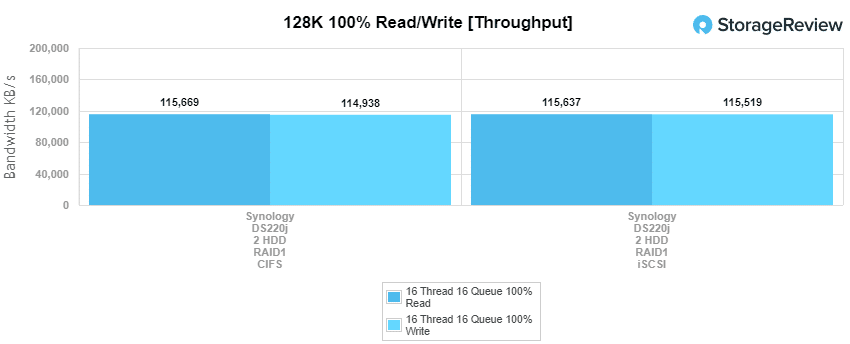
Conclusion
Like its 4-bay counterpart (the DS420j), the Synology DiskStation DS220j was a pleasant surprise. It offers home users and small offices a way to add a up to 32TB of personal Cloud space or a media server. The bare models go for roughly $175, which is a fantastic price for an NAS solution. When it comes down to it, however, you’re essentially buying access to DSM, which is certainly the main selling point of any DiskStation. It brings a powerful NAS management system with enterprise-like functionality to consumers.
To test its performance, we looked at a RAID1 configuration with both iSCSI and CIFS via two 4TB Seagate IronWolf HDDs. Unsurprisingly, results leaned more in favor of iSCSI overall when it came to read performance; however, CIFS showed better numbers with writes. In our 4K tests we saw read scores of 714 IOPS, 358.2ms average latency, 1,709.5 max latency, and 205.4ms standard deviation for iSCSI, while CIFS showed 117 IOPS, 2,178.2ms average latency, 4,083ms max latency, and 123ms in standard deviation. With 4K write iSCSI gave us 361 IOPS, 707.8ms averaging latency, 5,971.7ms max latency, and 739.5ms standard deviation. CIFS 4K write scores were 375 IOPS, 680.7ms average latency, 3,837.6ms max latency, and 245.1ms standard deviation.
For 100% 8K sequential throughput, the DS220j had a strong showing in iSCSI with 14,274 IOPS read and 14,246 IOPS write, while CIFS recorded 14,181 IOPS read and 10,988 IOPS write. With a 128K large-block sequential test, iSCSI saw 115.6MB/s read and 115.5MB/s write while CIFS had 115.7MB/s read and 114.9MB/s write.
The affordable yet powerful DS220j is a great addition to Synology’s entry-level “j” line. It gives all the benefits of DSM inside a tightly packed and affordable 2-bay NAS.




 Amazon
Amazon